Presidential rivals denounce Donald Trump’s call to ban Muslims from entering United States
- Share via
By the numbers
Welcome to Trail Guide, your host through the wilds of the 2016 presidential campaign. It's Monday, Dec. 7, and here's what we're talking about:
- Donald Trump calls for banning Muslims from entering the United States a day after he said regular profiling of Muslims in America is something that should be considered.
- The San Bernardino attack has reshaped the 2016 election , and The Times' David Lauter and Evan Halper explore the ins and outs.
- Ted Cruz has some steam in Iowa, a new poll shows.
- Is it "radical Islamic terrorism" or not? Presidential hopefuls offer differing opinions.
Clinton fundraises off Trump's Muslim idea using Huma Abedin
Hillary Clinton's loyal aide Huma Abedin, the subject of GOP scrutiny and frequently in the headlines , attached her name to a fundraising email for the campaign to jab at Donald Trump for his immigration ban proposal .
It went out to supporters on the email list with the subject line "I'm a proud Muslim."
Here's the email.
Donald Trump is leading in every national poll to be the Republican nominee for president.
And earlier today, he released his latest policy proposal: to ban all Muslims from entering our country.
I'm a proud Muslim -- but you don't have to share my faith to share my disgust.
Trump wants to literally write racism into our law books. His Islamophobia doesn't reflect our nation's values -- it goes far enough to damage our country's reputation and could even threaten our national security.
Unfortunately, Trump is leaning into the kind of fear of progress that very well could help him win the nomination. We have to be ready to stop him.
Add your name to stand with Hillary and build a stronger, fairer, more inclusive country together:
Thank you,
Huma
Huma Abedin
Vice Chair
Hillary for America
The email has a large, red "add my name" button that links to a signup page on the Clinton campaign site.
Presidential candidates react to Trump
Calling out Donald Trump
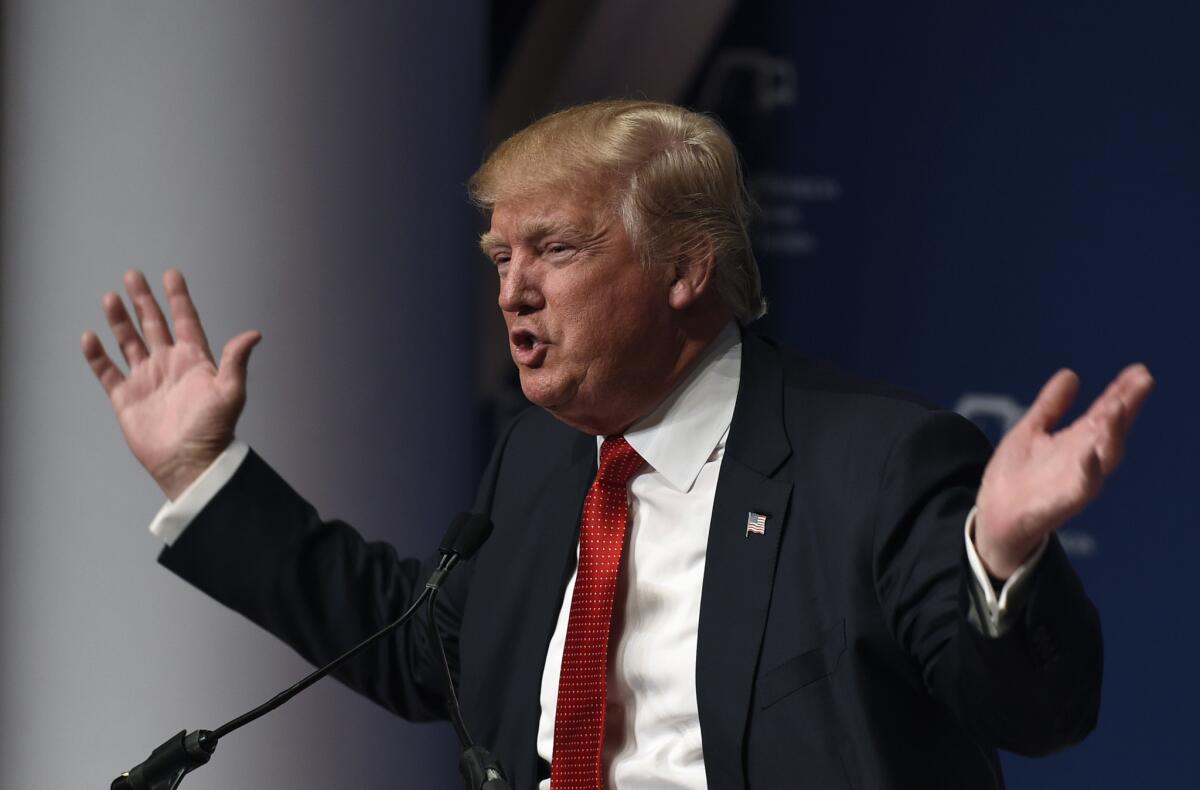
Republican presidential candidate Donald Trump speaks at the Republican Jewish Coalition Presidential Forum in Washington on Dec. 3.
Donald Trump calls for Muslims to be barred from entering the United States
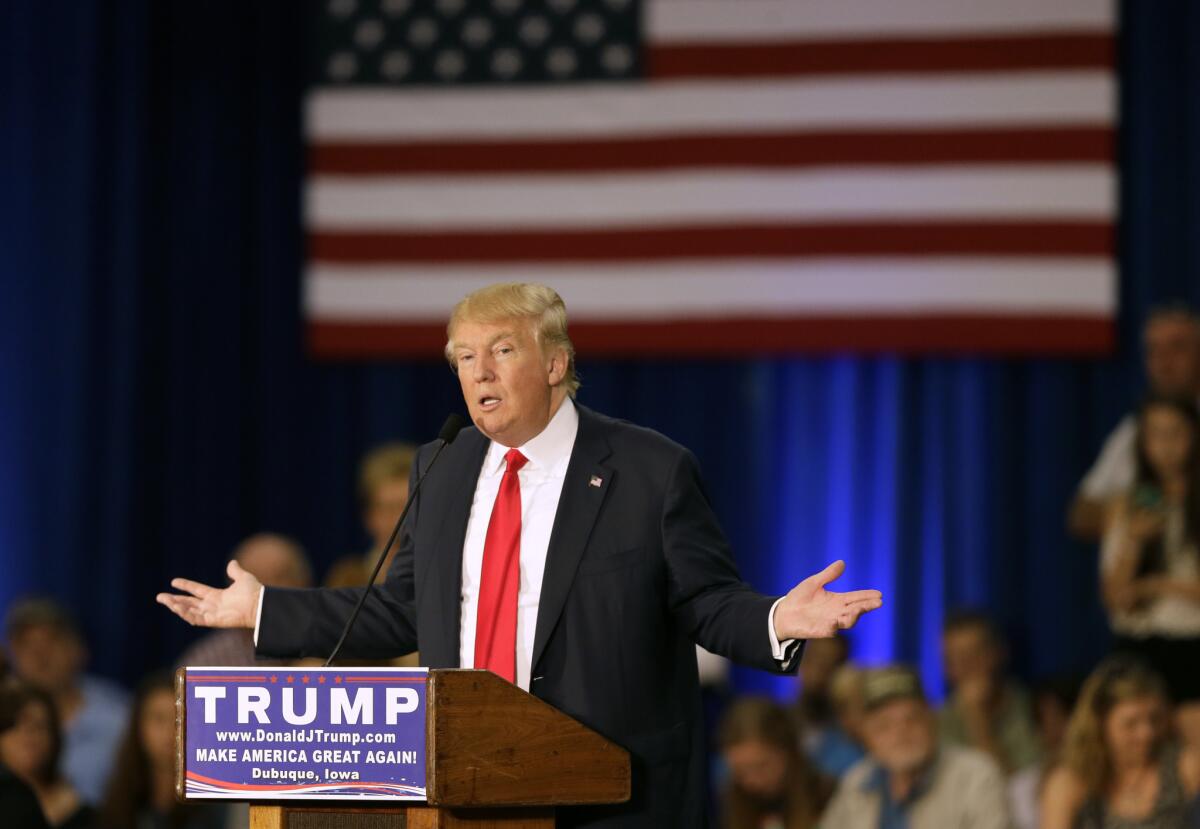
Republican presidential candidate Donald Trump at a rally in Dubuque, Iowa, on Tuesday.
Donald Trump on Monday called for all Muslims to be denied entry into the United States for an indefinite period of time. In his statement, he said that “people that believe only in jihad” need to be excluded.
The statement is the latest in a steady escalation of Trump’s rhetoric about Muslims and immigrants in general. Over the weekend, he said that at least some Muslims already in the U.S. should be “tracked.”
Islamic law, known as “sharia, authorizes such atrocities as murder against nonbelievers who won't convert, beheadings and more unthinkable acts that pose great harm to Americans, especially women,” Trump said in the statement, issued by his campaign.
“Where this hatred comes from and why we will have to determine,” Trump said. “ Until we are able to determine and understand this problem and the dangerous threat it poses, our country cannot be the victims of horrendous attacks by people that believe only in jihad, and have no sense of reason or respect for human life.”
The statement called for “a total and complete shutdown of Muslims entering the United States until our country's representatives can figure out what is going on.”
Since the terrorist attacks in Paris last month, and more recently in San Bernardino, Trump’s campaign has focused largely on what he has described as the threat to the U.S. from Islamic terrorists.
He has previously called for closing some mosques and creating a database to register Muslims in the United States. He also has said he saw television coverage of “thousands of people” cheering in New Jersey as the World Trade Center towers collapsed in the Sept. 11 attacks – a claim debunked as false by local law enforcement and elected officials. And on Sunday, he said the idea of profiling is valid considering the recent terrorist attacks.
Trump’s comments about Muslims have been rebuked by some other Republican candidates, including former Florida Gov. Jeb Bush and New Jersey Gov. Chris Christie, and by Democrats. The remarks have also drawn protests from Muslim groups.
In a recent interview with The Times, Ibrahim Hooper, a spokesman for the Council on American-Islamic Relations in Washington, said Trump’s rhetoric is essentially fear-mongering and harmful to the country as a whole.
“It’s very, very dangerous and detrimental to the country,” Hooper said. “When you’re pandering to the lowest common denominator of your party, it can lead to bigotry and give false perceptions.”
Trump remains the leader in national polls of Republican candidates and in many polls of early primary states. A survey released Monday by Monmouth University showed him in second place behind Sen. Ted Cruz of Texas in Iowa, which holds the first contest of the primary season.
In Nevada, Harry Reid is set to host Democratic presidential hopefuls
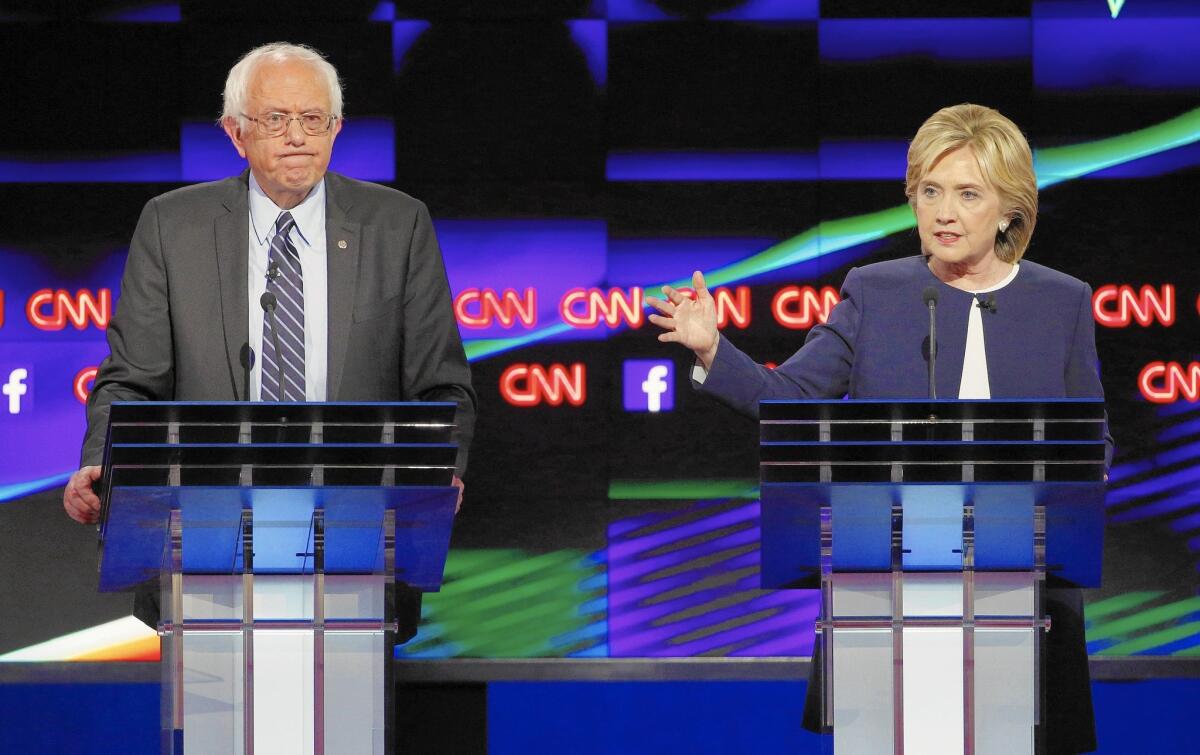
Nevada's role in presidential politics has become more significant in recent election cycles, with it now positioned as a critical Western state in the 2016 nominating process.
And Silver State Democrats and the party's standard bearer, Senate Minority Leader Harry Reid, are noting its importance by hosting a dinner on Jan. 6 -- six weeks before the state's caucuses -- with the three candidates vying for the party's nomination.
The Battle Born/Battleground First in the West Caucus Countdown Dinner will be the first time since October's Las Vegas debate in which former secretary of State Hillary Clinton, Vermont Sen. Bernie Sanders and former Maryland Gov. Martin O’Malley are together at the same event in the state.
Nevada will be third in the nominating process to vote in next year's presidential election, after Iowa and New Hampshire, according to Frontloading HQ, which closely monitors the primary and caucus calendars.
Clinton, the front-runner for the Democratic nomination, won the Nevada caucuses in 2008.
Support from the state’s large Latino electorate is critical to a candidate vying to win the state’s caucus, but it’s even more important in a general election. Nevada, along with Colorado, is one of two swing states in the West.
Poll confirms Cruz rise as Carson falls in Iowa
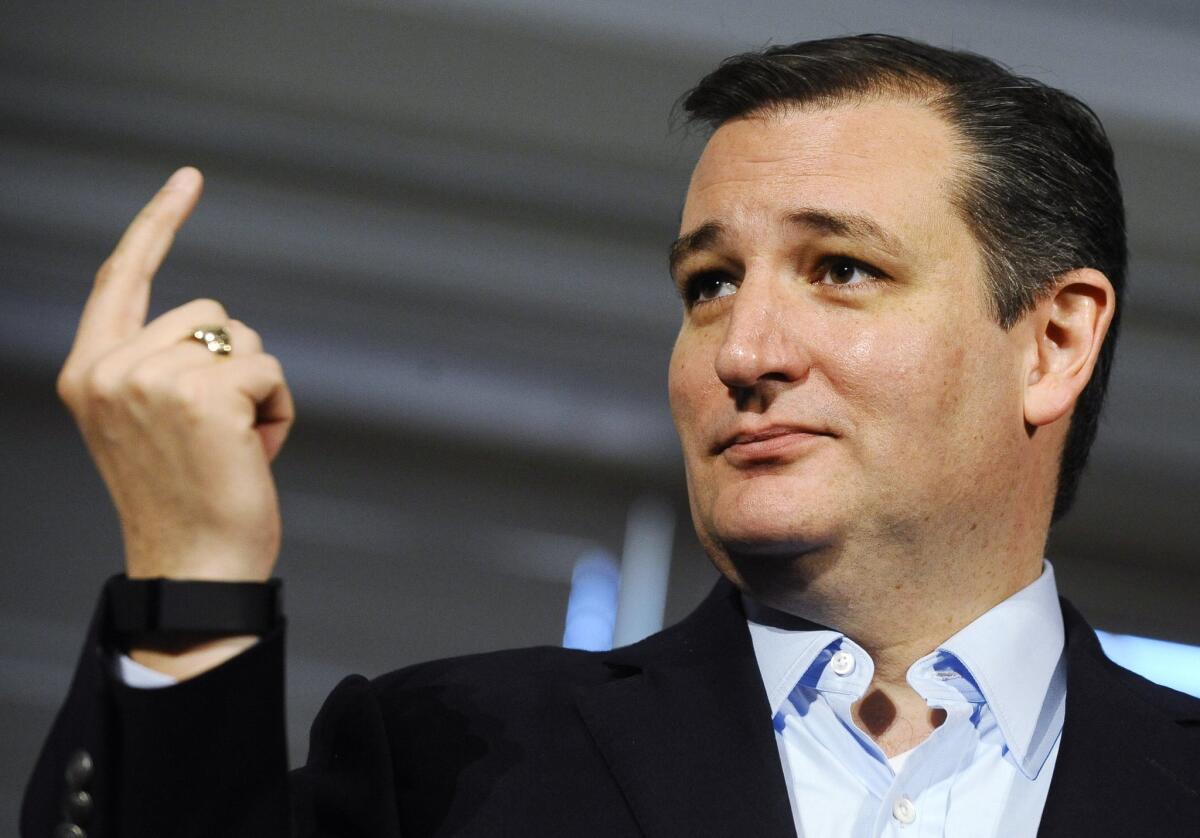
Republican presidential candidate Sen. Ted Cruz, R-Texas, speaks during a town hall meeting at Furman University on Monday, Dec. 7, 2015, in Greenville, S.C. (AP Photo/Rainier Ehrhardt)
We're still a few weeks away from the point at which polls become reliable in predicting winners of the early presidential primaries, but they do provide useful information about who is losing.
Ben Carson, for example.
In October, the retired neurosurgeon soared to the front of the pack in Iowa, which holds the first contest of the race, on the basis of strong support from evangelical voters. But as often happens with new faces in the political crowd, his prominence led to scrutiny, which led to a sharp decline. That drop has continued as political debate has focused more on foreign policy in the aftermath of the terrorist attacks in Paris and San Bernardino.
So far, the main beneficiary of Carson's decline has been Sen. Ted Cruz of Texas. The latest poll from Iowa, by Monmouth University, illustrates the pattern: Carson's support has dropped from 32% to 13% since October; Cruz's has risen from 10% to 24%, and he is now in first place.
As with Carson, Cruz benefits from strong support from evangelical Christians, who typically make up about half of Iowa's Republican caucus voters. Cruz gets nearly one-third of the evangelical vote, the poll found.
Donald Trump was in second place in the poll, with 19%. Sen. Marco Rubio of Florida was in third, at 17%.
As other surveys have shown, Trump did better among independents who said they planned to vote in the GOP caucus. Actually getting those voters to show up will test the organizational ability of Trump's campaign, because many independents have little history of participating in the caucus meetings.
The poll, which was conducted by telephone using landlines and cellphones, has a margin of error of +/- 4.8 percentage points.
De Blasio: Trump facilitating Islamic Atate's plan
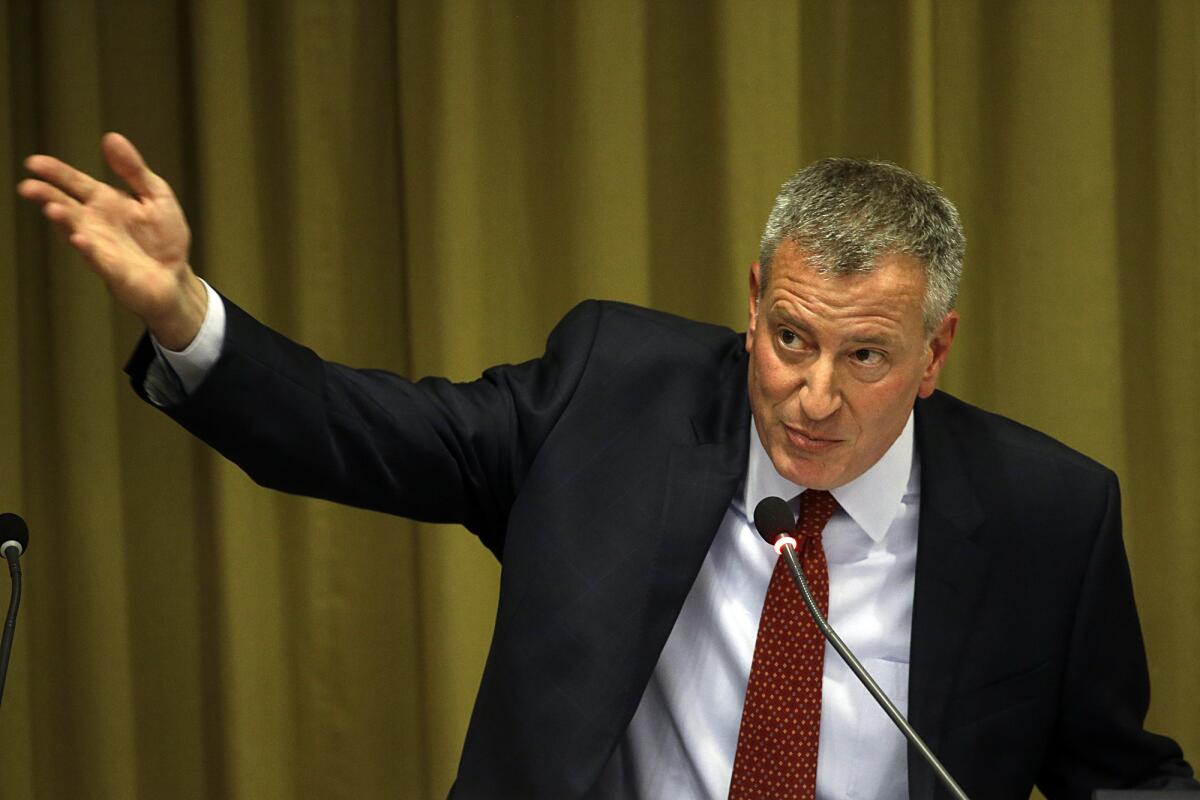
New York Mayor Bill de Blasio speaks during a Vatican conference on climate change.
The words of GOP candidate Donald Trump fall right into Islamic State's game plan, New York Mayor Bill de Blasio said Monday.
"What Donald Trump is doing, in one way or another, is doing the bidding of our enemies,” De Blasio said in an interview with CNN’s “New Day.”
“Because our enemies, in particular ISIS, want to see the American people divided, for example, against the Muslim American community," De Blasio said, using an alternate name for Islamic State.
De Blasio’s comments mirror President Obama’s concerns, expressed during his Oval Office address Sunday, that Muslim communities in the U.S. don't become isolated.
The mayor's criticism also comes after he and Trump started battling last month. It began when Trump labeled De Blasio the “worst mayor in the history of New York City.”
De Blasio fired back last week aftero Trump’s address at a Republican Jewish Coalition forum in Washington. The Republican presidential candidate referred to himself as a “negotiator like you,” which de Blasio said perpetuates a stereotype of Jewish people. Some leaders of the coalition didn’t agree with De Blasio’s claims of anti-Semitism in the speech.
De Blasio said he hopes more of the people who find Trump's comments entertaining will realize that such statmenta hurt Americans.
"What [Trump] is saying is corrosive to our democratic values,” De Blasio said. “It's dangerous. And I'll call him out.”
Trump wants Obama out after Sunday's speech
Republican presidential front-runner Donald Trump attacked President Obama's Oval Office address before it even started.
Using his preferred platform of Twitter, Trump warned that Obama was in for criticism if he talked about the 2nd Amendment too much.
And he promised to live-tweet the address, but it only ran 13 minutes, shortening his window for criticism.
Obama called the San Benardino shootings an “act of terrorism” in his speech. He also called on Congress to add restrictions to the current gun laws, including rules regarding people on the no-fly lists. Finally, he encouraged Americans not to fear all Muslims, but did acknowledge some Muslim communities do have problems with extremism.
For his part, Trump pointed out Obama’s use of a teleprompter and lectern in the Oval Office to criticize the president’s presentation.
Followers of Trump on Twitter also showed their disdain for the administration, and he retweeted some of those messages.
Trump concluded after the speech that he thinks America needs a new president and “fast.”
How the shooting in San Bernardino upended the 2016 race for the White House
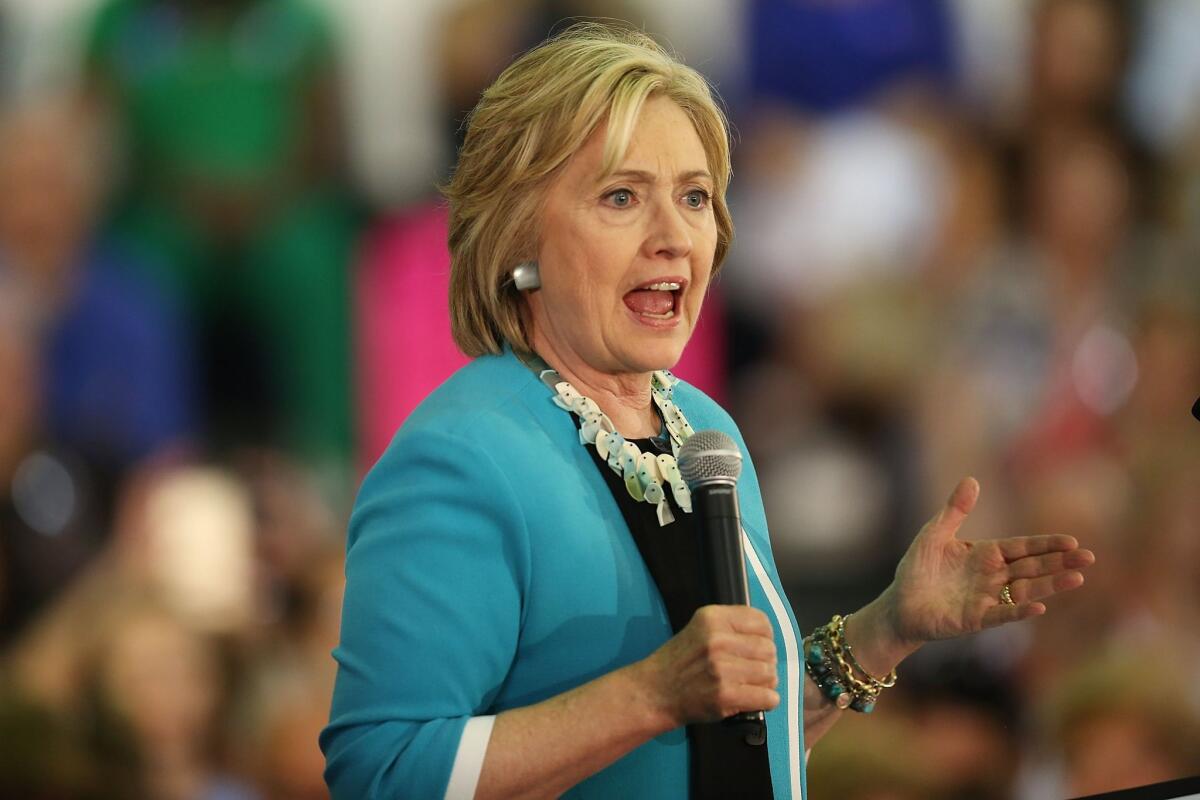
Hillary Rodham Clinton campaigns in Florida.
The mass shooting in San Bernardino has had a strong effect on the 2016 presidential election, causing differing views from Democrats and Republicans.
But both sides face one central problem: The nature of what officials have called a terrorist attack defies the solutions that either has been offering.
Because the attack does not appear to have been centrally directed or planned, a more intense assault on Islamic State’s positions in Iraq and Syria, as Republicans have advocated, might have little effect on preventing recurrences.
And because the attackers purchased their weapons legally after going through the required background checks, the preferred Democratic response of expanding gun background-check systems to cover additional sales has little relevance.
The Times' David Lauter and Evan Halper have more on the political fallout.
By the numbers
Get the L.A. Times Politics newsletter
Deeply reported insights into legislation, politics and policy from Sacramento, Washington and beyond. In your inbox three times per week.
You may occasionally receive promotional content from the Los Angeles Times.







